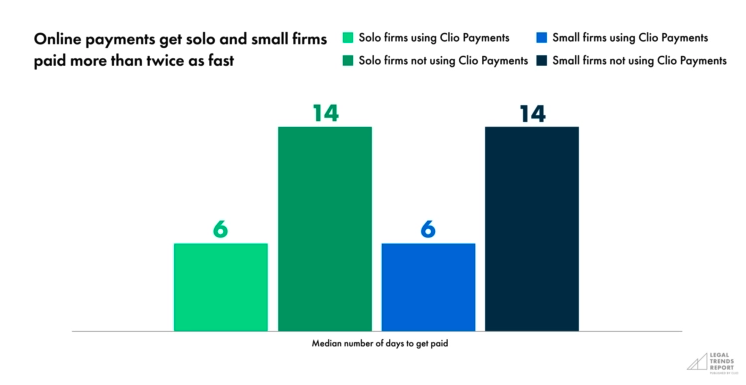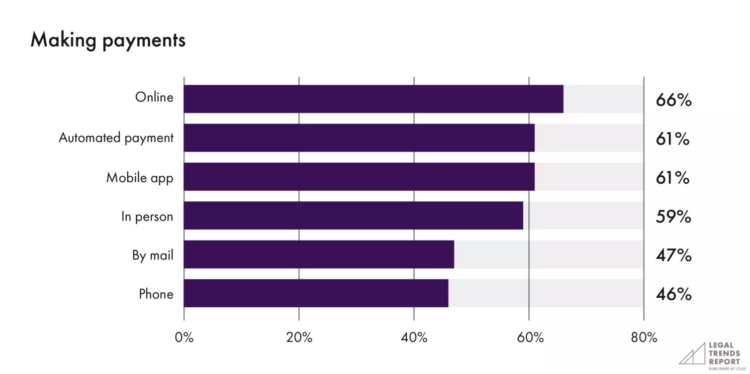Client expectations are changing, and how small firms and sole practitioners interact with their clients is evolving rapidly. With competition intensifying and client expectations rising, the need for effective client relationship management has never been more critical. Technology offers tools that enhance client communication and help attract and retain a broader client base, putting you in control of your practice’s growth.
According to the 2024 Legal Trends for Solo and Small Law Firms report, the legal industry is witnessing a significant shift in how sole practitioners and small law firms operate. Technology is playing a pivotal role in shaping the future of client relations.
To supplement our Legal Trends report, we conducted research involving 250 UK solicitors working in small firms or as sole practitioners to gain insights into the evolving landscape of client relations and technology adoption in the UK. This research provided valuable data on how these legal professionals are leveraging new tools and strategies to enhance client communication, improve payment processes, and attract new clients.
The findings from this study form the basis of the insights shared in this blog, highlighting the significant impact of technology on daily operations and client interactions within the UK’s small legal practices.
Get Your Copy of the Report
Download the 2024 Legal Trends for Solo and Small Law Firm for more insights.
The growing importance of client relationship management
Client relationships have always been the cornerstone of legal practice, especially for sole practitioners and small firms, where personal touch and client trust are paramount. However, traditional methods of managing these relationships—relying heavily on in-person meetings, phone calls, and paper-based communication—are becoming less efficient and less effective in meeting modern clients’ needs.
As the report highlights, client expectations are shifting towards greater transparency and accessibility. Clients now prefer law firms that offer digital solutions, such as online portals for case updates and electronic communication channels. To meet these demands, legal professionals are turning to technology to help manage client relationships more effectively. Adopting Customer Relationship Management (CRM) and client onboarding tools, for example, allows solicitors to keep track of client interactions, set follow-up reminders, and ensure that no client is ever forgotten. These systems provide valuable insights into client preferences and behaviours, enabling more personalised and proactive service.

Leveraging AI for enhanced client communication
Artificial Intelligence (AI) is no longer a futuristic concept reserved for large law firms with deep pockets. Today, AI legal tools are becoming increasingly accessible to sole practitioners and small firms, offering a range of benefits that can significantly enhance client communication. These tools, by automating routine tasks, can make you feel more productive and efficient in your practice.
One key area where AI is making a difference is in billing and payment processes. Automated billing systems reduce the administrative burden on legal professionals and ensure that invoices are sent out promptly and follow-ups are conducted automatically. This not only improves cash flow but also enhances the client experience by making the payment process smoother and more transparent.
Only 40% of UK firms we surveyed currently use automated follow-ups for payments, but those who do report significant improvements in their lockup period. (“Lockup” measures how quickly law firms get paid after sending their bills to clients.)

Additionally, AI-powered chatbots and virtual assistants can handle routine client inquiries, provide updates on case progress, and even schedule appointments, freeing up valuable time for solicitors to focus on more complex tasks.
The 2024 Legal Trends for Solo and Small Law Firms report underscores the potential of AI in improving client service delivery by automating routine tasks, which not only enhances operational efficiency but also allows legal professionals to offer more personalised attention to their clients.
You may like these posts
Flexible payment plans and online payment methods
Economic conditions and client payment capabilities can often challenge small firms and sole practitioners. Clients may struggle to pay large legal fees upfront, leading to delayed payments and cash flow issues for the firm. To address this, many legal professionals are adopting flexible payment plans that allow clients to pay over time.
Technology plays a crucial role here as well. 96% of solicitors surveyed said online payment methods allowed them to speed up payment collection times. The widespread adoption of online payment methods has made it easier and faster for clients to settle their bills. These online platforms offer clients the convenience of paying via credit card, bank transfer, or even digital wallets, reducing the time it takes for payments to be processed and collected. Moreover, offering early payment discounts through automated invoicing systems can incentivise clients to pay promptly, improving their firm’s financial health.
Our research also highlights the increasing use of flexible payment options, with 60% of firms offering such plans to accommodate clients’ financial situations. This approach helps improve client satisfaction and retains clients who might otherwise struggle to afford legal services.
The majority of clients want to pay their legal bills online, using online payment options like credit and debit cards, digital wallets and pay-by-bank transfers.

Enhancing client communication
Effective communication is critical to building and maintaining strong client relationships. For sole practitioners and small firms, this often means juggling multiple client relationships simultaneously, which can be challenging without the right tools. As mentioned earlier, legal CRM systems are invaluable, providing a centralised platform where all client interactions are recorded and managed.
In addition to CRM systems, some small firms are now appointing dedicated client liaison officers to serve as clients’ primary point of contact. This role is especially beneficial in firms where the legal team is stretched thin, as it ensures that clients always have someone to turn to with their questions or concerns. These officers can also use CRM data to provide personalised service, ensuring clients feel valued and understood.
The research also emphasises the importance of regular updates and communication in maintaining client satisfaction. 56% of firms surveyed rely on regular updates and reminders to keep clients informed, which is essential for building trust and ensuring transparency in the client relationship.
Using technology to attract new clients
Beyond improving existing client relationships, technology is also helping sole practitioners and small firms attract new clients. Digital marketing tools, such as SEO (Search Engine Optimisation) and social media advertising, allow firms to reach a wider audience than ever before. These tools can be particularly effective in targeting specific demographics or geographic areas, ensuring that the firm’s services are visible to potential clients who are most likely to need them.
Moreover, client management tools enable firms to track leads and follow up with potential clients efficiently. Automated email marketing campaigns can nurture these leads, providing valuable content and information that builds trust and encourages prospects to choose the firm when they need legal services.
The report also highlights the growing importance of online reviews and client testimonials in attracting new business. With more clients turning to the internet to research legal services (a whopping 96% of people start their search for a lawyer online), a robust online presence, bolstered by positive client feedback, can be a powerful tool in winning new clients.

Balancing technology with personalised service
While technology offers numerous benefits, it is essential to remember that the human element remains crucial in legal practice. Sole practitioners and small firms are uniquely positioned to provide personalised, attentive service that larger firms may need help to match. The challenge lies in finding the right balance between leveraging technology and maintaining the personal touch that clients appreciate.
By using technology to handle routine tasks and streamline processes, lawyers can free up more time to focus on building deeper relationships with their clients. This blend of tech-driven efficiency and personalised service is a winning combination that can separate small firms and sole practitioners.
Embracing the future of client relations
The legal landscape is changing, and those who fail to adapt risk being left behind. For sole practitioners and small firms in the UK, adopting technology is not just about keeping up with the times—it’s about staying competitive and providing the best possible service to clients. By embracing tools like client onboarding software, AI, and online payment platforms, legal professionals can enhance client relations, improve their bottom line, and grow their practice.
Those who successfully integrate technology into their client relationship strategies will be best positioned to thrive in the evolving legal market. The key is to start small, focus on areas where technology can have the most impact, and always keep the client experience at the forefront of every decision.
2024 Legal Trends for Solo and Small Law Firms
We published this blog post in August 2024. Last updated: .
Categorized in: Business
Explore AI insights in our latest report
Our latest Legal Trends Report explores the shifting attitudes toward AI in the legal profession and the opportunities it brings for law firm billing, marketing, and more.
Read the report






